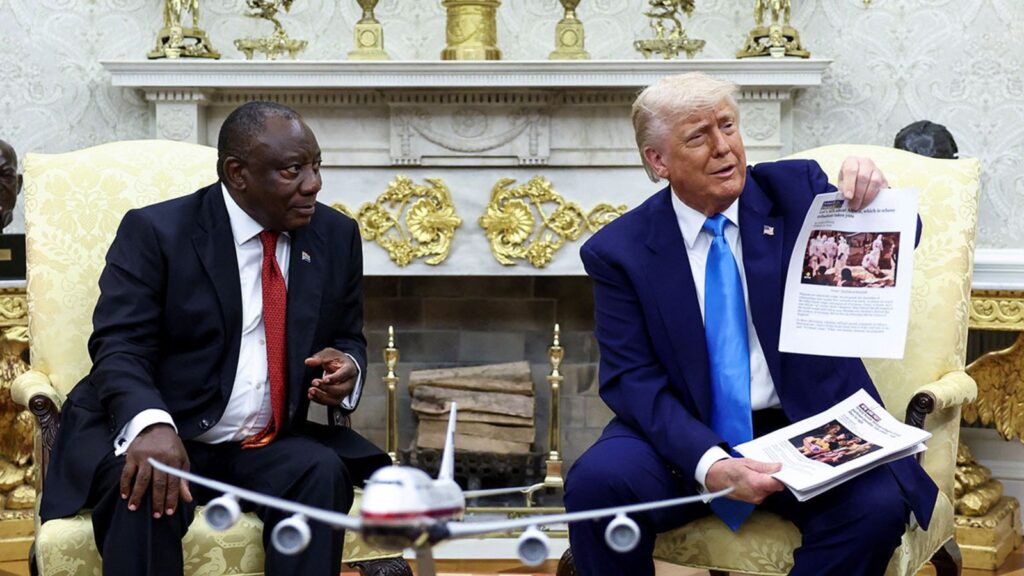Tensions Rise Between Trump and Ramaphosa Over South Africa’s Issues
In an unexpected turn of events during a meeting at the White House, former President Donald Trump confronted South African President Cyril Ramaphosa on issues surrounding the Afrikaner community and the perceived plight of white farmers in South Africa. This confrontation has left the South African public divided, as various political factions weigh in on the implications of Trump’s claims and Ramaphosa’s response.
A Radical Political Encounter
Trump has resonated with right-wing Afrikaner groups, who were quick to celebrate his pointed comments about South Africa’s socio-economic challenges. The Solidarity Movement, a vocal representative of these groups, welcomed Trump’s aggressive stance, stating that it highlighted the “enormous problems” facing South Africa.
Leading Afrikaner figure Ernst Roets praised Trump on social media, exclaiming, “Donald Trump made history today,” while expressing gratitude for shedding light on videos and articles depicting violence against white farmers. Some members of the Solidarity Movement even suggested that Trump deserved accolades, such as a Nobel Prize, for raising global awareness regarding the so-called “farm murder crisis.”
Ramaphosa’s Composed Counter
President Ramaphosa maintained his composure under pressure, skillfully redirecting the conversation to broader issues affecting all South Africans, regardless of race. He emphasized the unified efforts of the multi-party government in addressing high crime rates and a staggering unemployment rate of 32%, which disproportionately affects black citizens.
During the Oval Office meeting, various South African representatives were present, including John Steenhuisen, the agriculture minister and leader of the Democratic Alliance (DA). He acknowledged serious safety concerns but countered Trump’s narrative, stating, “Most of South Africa’s farmers want to stay and make it work.” Steenhuisen further highlighted the necessity for international allies to assist in strengthening South Africa’s economy.
Polarization of Perceptions
The encounter has sparked significant debate within South Africa. Critics argue that the right-wing lobbyists are not acting patriotically by seeking intervention from the U.S. They believe that local issues, including crime—which is affecting every demographic—should be addressed internally. Ramaphosa defended South Africa’s democratic credentials and the EFF’s right to exist, despite the concerns about inflammatory rhetoric from its leader, Julius Malema.
Historically, Malema’s song “Shoot the Boer,” which was once an anti-apartheid anthem, is seen by Afrikaner groups as incitement to violence. However, South Africa’s Supreme Court has ruled that the song is a political tool aimed at highlighting economic injustices, emphasizing the importance of context in political expressions.
A Divided Nation
While Ramaphosa invoked the spirit of Nelson Mandela during discussions, asserting that unity was crucial for progress, divisions remain within South African society. Some Afrikaners feel increasingly marginalized and express a desire to emigrate, with Trump offering refugee options for those feeling threatened.
The meeting’s uncomfortable nature was acknowledged by various figures, including South African billionaire Johann Rupert, who pointed out the stark realities faced by impoverished communities in townships, stating that crime is a pervasive issue affecting many. Zingiswa Losi, the president of the largest trade union in South Africa, echoed this sentiment, calling for an approach to tackle crime rather than focusing solely on racial narratives.
Table of Key Issues from the Trump-Ramaphosa Meeting
| Issue | Trump’s Position | Ramaphosa’s Response |
|---|---|---|
| White Farmer Safety | Claims of persecution | Denies systematic violence; calls for unity |
| Crime Rate | Focus on white victims | Highlights issue affects all South Africans |
| Political Extremism | Calls out EFF’s rhetoric | Defends EFF’s right to exist |
As discussions regarding South Africa’s future continue, the meeting has underscored deep divisions in perceptions of race relations and the narrative of governance in the country. Moving forward, it appears essential for South Africa to address not just crime but also the socio-political dynamics that shape its complex landscape.


